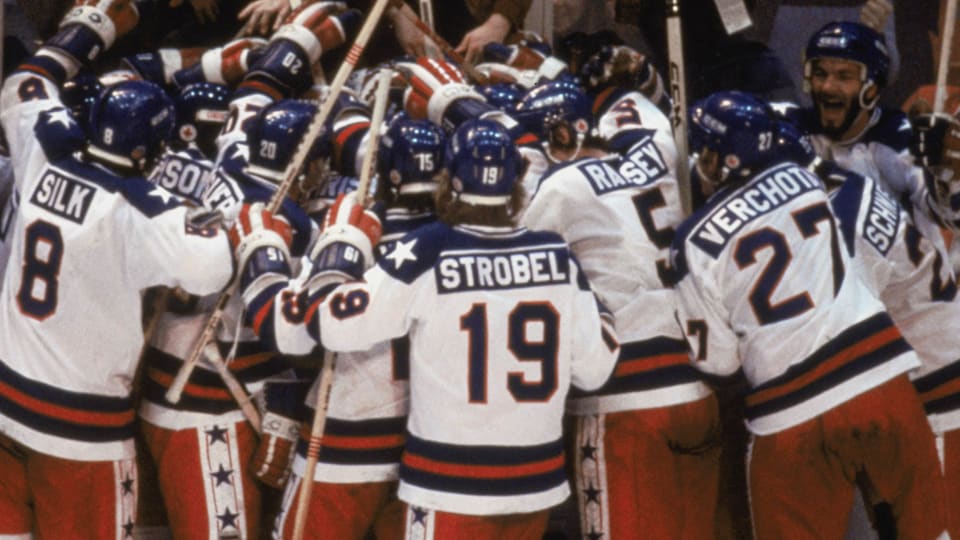Snapped: the moment that proved miracles do happen
It is commonly known as the ‘Miracle on Ice’. In 2016, Sports Illustrated declared it to be the greatest moment in sporting history. But what was it like to captain the USA ice hockey team of rank outsiders to victory against the mighty Soviet Union at the 1980 Lake Placid Olympic Winter Games and score the winning goal? Mike Eruzione is the only man that knows…

“Nobody thought we could win that game. Heck, nobody thought we could win a medal,” said Eruzione, a Boston University graduate chosen to lead a seemingly ragtag bunch of college players and amateurs into the 1980 Games. “We were supposed to come anywhere from seventh to 10th place.”
The reasons no one gave the host nation a chance were plentiful and highly persuasive. For one thing, the Soviet Union stood out like colossi. Not only had they claimed five of the six previous Olympic gold medals but, in contrast to the USA, and just about everyone else, their squad was brimful of players who did nothing but play hockey. The squad, led by legendary coach Viktor Tikhonov, are widely considered to be the finest ever assembled.
“We never even thought about the Soviets, they never even entered our mind,” Eruzione said. “We were worried about Sweden, Czechoslovakia, West Germany, Romania and Norway – the countries in our group.”
As the group stage progressed, however, the home team – pruned from 80 try-outs to a final squad of 20 several months before the Games – started to generate some attention. A 2-2 draw against the fancied Swedes and a stunning 7-3 victory against most people’s second favourites, Czechoslovakia, propelled the USA into the medal round.
Facing them first up was, of course, the Soviet Union. The two teams had met in an exhibition match at Madison Square Garden, New York, just weeks before the Games started – with the men from the East humiliating their hosts 10-3.
“When we played them in Madison Square Garden we just stood around and watched and didn’t engage at all,” Eruzione recalled. “The second time round it was different though. The way we were playing, the confidence we had, we were a different hockey team. It’s funny, we never even discussed the last time we played them. It never came up. Herb never said anything. It was almost like we had never even played them before.”
The Herb Eruzione referred to was Herb Brooks, the tough, intense, ‘old school’ USA coach. As uncompromising as he was, captain Eruzione has always been convinced Brooks was the perfect man for the job.
“Was Herb hard to play for? Yes. But the alternative was (to) quit and I wasn’t quitting – you can yell at me all you want and I am still going to come back and practise the next day,” Eruzione said. “And I think that is how our team approached it and understood it. Herb was going to be hard and demanding but it was OK because we trusted him, we respected him and we believed in what he was doing.”
Despite it taking place on 22 February 1980, the now 64-year-old Eruzione can take himself “back in an instant” to what happened next.
Right from the hooter the USA were transformed. Falling behind to an early goal did not signal a collapse as it had just before the Games. Instead the team finished the first period tied 2-2 and were just 3-2 down at the start of the final period. An equaliser came before captain Eruzione found himself unmarked in front of goal with just 10 minutes left to play.
“We actually took it to them a little, we never stood back, we never tried to protect the lead,” Eruzione said, a smile clearly apparent in his voice. “We just kept playing and playing. I will tell you one thing though – it was a long 10 minutes.”
The USA’s host broadcaster Al Michaels famously summed it up best as the clock finally ran down with the USA still leading 4-3: “Do you believe in miracles? Yes.”
Like everyone else, Eruzione could barely comprehend what had happened: “I kept saying to myself over and over, ‘We beat the Russians, we beat the Russians’.”
Incredibly that was not it. The tournament structure – the top two teams in each preliminary group playing the top two teams from the other – meant that the USA still needed to defeat Finland in their final round-robin medal game to be certain of gold. Had the United States lost to Finland, the Soviet Union would have won gold, a fact coach Brooks knew only too well.
“The next day was one of our hottest practices. Herb made us very aware we had another game to play,” Eruzione laughed.
The USA nearly blew it, trailing 2-1 in the third period but ultimately the story got the ending it deserved. The team secured their spots as sporting immortals with a 4-2 triumph. Given the time and the historical context, the match’s legendary status has understandably evolved ever since.
“I can’t tell you how many times people come up to me and say, ‘I remember where I was when we won’ and the amount of letters I get,” Eruzione said. “And I get a lot of calls from college or high school students who are doing history reports on the cold war and they always want to bring up the hockey game. It’s kind of funny because we never looked at it as a political game. It was a hockey game to us.”
For the captain and winning goal scorer, however, there is one simple, enduring emotion that overrides all others.
“It is just great pride,” he said. “Knowing that all 20 of us came together and did something nobody in the world thought we could do.”
